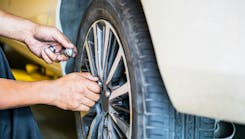Ask the Expert: Does nitrogen tire inflation really improve a vehicle's fuel economy and tire life?
Q: Does nitrogen tire inflation really improve a vehicle's fuel economy and tire life?
A: Yes and no. Nitrogen is an inert gas, meaning it is without properties or, in other words, it's essentially nothing. However, that's exactly what you want in a consumers' tires: nothing but pressure. What you don't want are some of the components and byproducts of compressed air, such as water, oil, particulate and, most importantly, oxygen.
Regular air is about 79 percent nitrogen, 20 percent oxygen and 1 percent "other." Run this regular air though a compressor, and you may add trace amounts of oil, water and other contaminants that are not good for tires, wheels and valves that are made of rubber and metal. However, the greatest evil of regular air, as it relates to tire inflation, is oxygen. Oxygen is a component of water, the "O" in H2O, and the catalyst of "oxidation," otherwise known as rust, rot and corrosion. Remove the oxygen from a tire and wheel assembly and you have also eliminated the chance of internal oxidation... it simply cannot occur, which is great for your tires and wheels.
The greatest disadvantage of oxygen, however, is its molecular size. Air-filled tires, as you probably know, lose pressure at the rate of at least one psi per month through normal "permeation." Nitrogen filled tires, on the other hand, typically lose NO pressure over a one-month period. This is because the size of a molecule of oxygen, which again comprises about 20 percent of regular air, is roughly one quarter of the size of a molecule of nitrogen. Underinflated tires run warmer, wear out faster and increase rolling resistance, which wastes energy (i.e., fuel).
Therefore, while nitrogen itself has no magic powers, inflating and maintaining a vehicle's tires with nitrogen will provide better fuel economy, longer tire life and enhanced safety. Not because of what nitrogen is, but rather because of what it is not: oxygen.
A recent study from Clemson University indicates that oxygen free, or nitrogen inflated, tires can last up to 50 percent longer, provide up to 10 percent better fuel economy and fail much less frequently.
View the Clemson University study regarding the benefits of nitrogen inflation.
Information provided by: Dan Brancaccio, National Sales Manager, NitroFill, LLC



